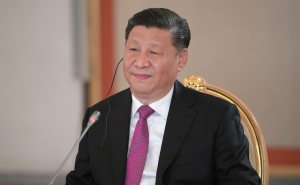In his 25-minute speech at the World Economic Forum (WEF) on January 25, Chinese President Xi Jinping called on countries to uphold international rules and to remain “committed to openness and inclusiveness.” “The problems facing the world are intricate and complex. The way out of them is through upholding multilateralism and building a community with a shared future for mankind,” Xi said. The address was the Chinese leader’s first appearance at Davos in four years, following a speech in 2017 when he strongly advocated for free trade and defended the benefits of globalization. The gathering, typically in person at a ski resort in Switzerland, was held via video link due to the ongoing pandemic, while an annual meeting is slated to take place in late May in Singapore.
While Xi’s speech may have echoed similar themes from his 2017 address, today’s circumstances are markedly different.
For one thing, despite trade tensions between Beijing and Washington, China’s economic position appears to have grown stronger. In 2020, China emerged as the only major economy to avoid falling into recession in face of the COVID-19 pandemic, expanding by 2.3 percent while the U.S. economy and the eurozone are expected to have shrunk by 3.6 percent and 7.4 percent respectively. China’s economic recovery raised the country’s share of global GDP to 16.8 percent compared to 14.2 percent in 2016 (the U.S. economy accounted for 22.2 percent of global GDP last year). Meanwhile, the Chinese economy is forecast to grow by around 8 percent this year, notching its largest growth in nearly 10 years.
Xi’s speech outlined a series of major tasks for moving forward. First, he urged countries to embrace openness and multilateralism. Part of his advocacy for multilateralism included bolstering the role of the G-20 – “the premier forum for global economic governance” in Xi’s words – to coordinate macroeconomic policy. (The G-20 is a forum for representatives from Argentina, Australia, Brazil, Canada, China, the European Union, France, Germany, India, Indonesia, Italy, Japan, Mexico, Russia, Saudi Arabia, South Africa, South Korea, Turkey, the United Kingdom, and the United States, first set up in 1999 to discuss international financial stability.)
Second, Xi emphasized the importance of abiding by international law and international rules, stating that “international governance should be based on the rules and consensus reached among us, not on the order given by one or the few.” Xi also pushed for greater commitment to consultation, guaranteeing equal rights to development, and greater reform of the existing global governance system.
He concluded by articulating China’s efforts to address the immediate obstacle of combating COVID-19 as well as longer-term challenges to development, from sustainability to technology and innovation. Despite criticism over China’s lack of transparency about the spread of the coronavirus and access for WHO investigators, Xi took the opportunity before the WEF to promote its provision of assistance to over 150 countries and 13 international organizations, and cooperation on making COVID-19 vaccines available and affordable to developing countries.
Notably, Xi’s two Davos speeches both coincided with a leadership transition in the United States, the world’s largest economy. While Beijing may have capitalized on the former Trump administration’s suspicion of and recoiling from multilateralism, its embrace of global governance has been an enduring characteristic of Xi Jinping’s leadership. Xi’s latest speech may not have revealed a new direction for the country’s conduct of foreign affairs, but it underlined that Beijing remains resolute in leading the call for the Global South and the developing world to be given more voice, especially in times of crisis.

































